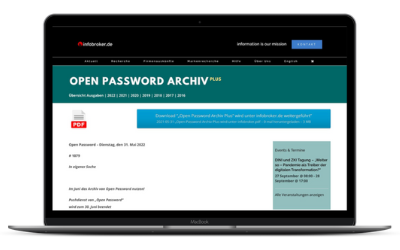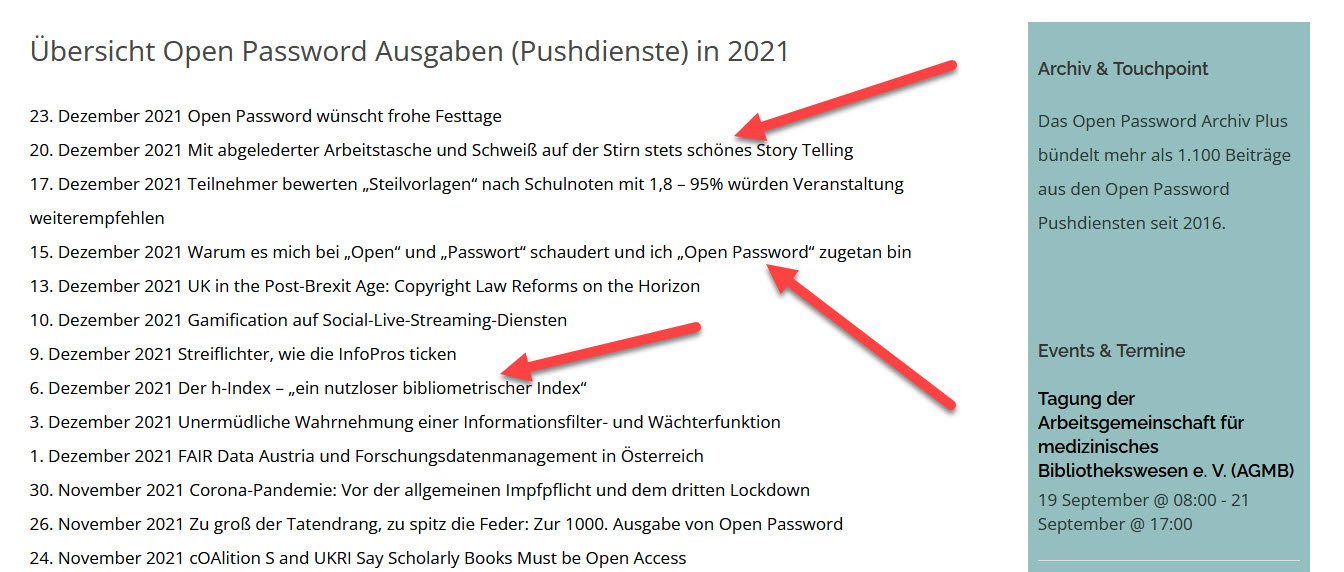Open Password – Dienstag, den 15. September 2020
# 823
Outsell – Customer Screening – Supplier Screening – ESG Data – ESG Analytics – Refinitiv – Due Diligence Reports – Sigwatch – NGO Campaigns – Knowledge Graphing – Machine Learning – RepRisk – Trucost – MSCI – Acuris – LexisNexis Risk Solutions – Arachnys – Know Your customer Screening – Data Provenance – Data Enhancing – Digitale Medienerfassung und Erschließung – Maschinelle Strukturanalyse – Multilinguale Indexierung – Ibero-Amerikanisches Institut – Christoph Müller – Manfred Hauer – AGI Information Management Consultants – Springer Nature – Open-Access-Bücher – COARD – Ros Pyne
Outsell´s Contribution for September
Refinitiv Moves into ESG Analytics
Customer and Supplier Screening Is Evolving
with ESG Data and Analytics
By Will Jan, VP & Lead Analyst
In the quest to include potentially valuable data associated with supplier, customer, and partner risk, Refinitiv is bolstering its third-party screening solution to include the use of reputation and ESG data. Making sense of a growing volume of data will demand more robust analytics. ___________________________________________________________________________
What to Know and Why It Matters
___________________________________________________________________________
Refinitiv, a major global player in financial services information and data, is expanding the capability of its Enhanced Due Diligence (EDD) reports by including alternative data sourced from Sigwatch, a provider of environmental, social, and governmental (ESG) and reputational impact data. Refinitiv EDD insights now enable users to screen companies and investments for governance and reputation risk. Such screening offers a higher level of scrutiny beyond traditional background checks on executives, beneficial ownership, and other company information that contributes to deal risk.
ESG data is especially valuable when evaluating global supply chain risk, mergers and acquisitions, and IPOs. Investment firms increasingly consider corporate reputation and how companies manage ESG initiatives as drivers of valuation. Investors are looking to allocate funds to companies that are effective at mitigating reputation and ESG risks because these organizations present lower liability.
The public continues to seek change in how companies are run: Since the start of 2019, non-governmental organizations (NGOs) have initiated nearly 11,000 actions against companies over their shortcomings in addressing ESG issues. As a result, ESG data has also become important in providing decision metrics for how companies conduct business. The partnership between Sigwatch and Refinitiv offers users visibility into the latest NGO campaigns that apply to more than 19,000 companies, projects, and brands.
___________________________________________________________________________
Analyst Rating: Positive
Recommended Actions for Refinitiv
___________________________________________________________________________
Recommended Actions for Refinitiv Refinitiv already possesses a multitude of in-house capabilities that could drive EDD insights further, specifically knowledge graphing and machine learning. Refinitiv could apply the algorithm behind Knowledge Graph to EDD to tie in all aspects of risk associated with a company, while machine learning can offer action recommendations (risk mitigation plans) based on the company’s specific business process.
With EDD’s added capabilities, Refinitiv can position itself even more aggressively in the corporate market, defending itself from reputation solution providers that cater to multiple industries, like RepRisk, Trucost, and MSCI.
Lastly, with added data comes the need to ensure data integrity. While Refinitiv is no newcomer in demanding data quality from its partners, the fact remains that ESG analytics is a relatively new field. The underlying data has been around for ages, but methods of collecting it, frequency of updates, and standards for use vary broadly, which ultimately impacts the resulting analytics. Refinitiv must continue to monitor its data partners for data relevance and credibility.
___________________________________________________________________________
Recommended Competitor Actions
___________________________________________________________________________
For EDD providers like Acuris, LexisNexis Risk Solutions, and Arachnys, the mission is to source more relevant data sets in support of screening. Data additions may come in the form of partnerships. For example, Refinitiv partnered with D&B and IHS Markit to enhance know your customer (KYC) screening, as each of these partners had unique data sets that help provide different angles on a subject.
After sourcing new data comes the need to tie all the information together via a relationship map or knowledge graph. This forms the baseline for identifying all contributing factors to enterprise risk, which ultimately provides the pathway to actionable recommendations.
Providers then need to expand their EDD applications by vertical to ensure that screening processes align with user requirements. For example, screening is very different in companies outside financial services than it is within financial institutions. The former may be looking to onboard suppliers possessing the least liability, while the latter could be seeking investment targets that will grow in valuation.
___________________________________________________________________________
Essential Actions
___________________________________________________________________________
The following actions will help information providers evolve their third-party screening capabilities to include ESG assessments.
Prove Data Provenance
ESG data providers must confirm that there is an indisputable right to use and sell their data. Most of this data comes from operational reports or transactional records that the companies being measured own themselves. Third-party providers of such ESG data must ensure that the information can be lawfully repurposed or sold.
Enhance the Data
Solution providers must map ESG data to other brand perception or valuation metrics. Because a key objective of ESG products is to correlate sustainable practices to corporate reputation, offering additional insight beyond raw ESG data would increase the value of the data.
Match Investments in Both Data and Analytics
While investment or partnership decisions are only as good as the data used to make them, analytics play a critical role. High-volume data clustering to uncover associations, correlations, and causations between social policies and corporate responses can only (realistically) be achieved by machines. The resulting analytics drives effective decisions.
Briefe
Maschinelle Strukturanayse und
multilinguale Indexierung
Sehr geehrte Damen und Herren, liebe Kolleginnen und Kollegen,
wir möchten Sie herzlich zu unserer Online-Veranstaltung einladen, die sich mit folgendem Thema beschäftigt:
Digitalisierte Medienerfassung und Erschließung: Maschinelle Strukturanalyse bibliografischer Metadaten von Zeitschriftenaufsätzen und multilinguale Indexierung am Ibero-Amerikanischen Institut
Das Ibero-Amerikanische Institut Stiftung Preußischer Kulturbesitz (IAI) erwirbt jährlich ca. 30.000 Zeitschriften und führt ca. 4.000 laufende Zeitschriften aus und über Lateinamerika, die Karibik, Spanien und Portugal sowie zu den Latino Studies. Für die formale Erfassung und inhaltliche Erschließung der Zeitschriften und Monografien nutzt das IAI seit Anfang 2020 AGI´s intelligentCAPTURE. Ausgehend von der Digitalisierung der Inhaltsverzeichnisse werden Monografien aus 12 Sprachen maschinell gemäß dem deutschsprachigen Schlagwortsystem des IAI erschlossen und Titel, Inhaltsverzeichnisse und maschinelle Indexierung in sechs Sprachen im Katalog repräsentiert. Die Erfassung der bibliografischen Metadaten der Zeitschriftenaufsätze (Online Content) basiert auf einer semantischen Strukturanalyse der Inhaltsverzeichnisse. Die Resultate werden über den K10plus und dandelon.com veröffentlicht.
Dr. Christoph Müller (Stellvertretender Direktor der Bibliothek des Ibero-Amerikanischen Instituts, Berlin) und Dipl. Inf. wiss. Manfred Hauer M.A. (Head of AGI-Information Management Consultants, Neustadt / Weinstraße) das Projekt vorstellen und anhand vieler Praxisbeispiele dessen Umsetzung.
Der Vortrag findet am Donnerstag, den 17. September 2020 um 18:00 Uhr per Zoom statt. Die Veranstaltung ist kostenlos. Bitte melden Sie sich bis zum 15. September 2020 unter bak@ub.tu-berlin.de an. Die Zugangsdaten zur Zoom-Veranstaltung senden wir Ihnen einen Tag vor der Veranstaltung per Mail zu.
Wir freuen uns, Sie auf unserer Veranstaltung zu begrüßen.
Mit freundlichen Grüßen Tania Estler-Ziegler (Vorstandsvorsitzende), Berliner Arbeitskreis Information (BAK), c/o Universitätsbibliothek der TU Berlin, Fasanenstraße 88, 10623 Berlin,
http://bak-information.de/
Springer Nature
Open-Access-Bücher werden mehr gelesen
Open-Access (OA)-Bücher werden in mehr Ländern gelesen, finden eine größere Verbreitung und werden häufiger zitiert als herkömmlich veröffentlichte Bücher (Nicht-OA-Bücher). Dies ist neine der Kernaussagen eines aktuellen White Paper, das gemeinsam von Springer Nature und COARD (Collaborative Open Access Research & Development) erstellt wurde. Gegenstand der Analyse war es, herauszufinden, ob und welchen Einfluss Open Access bei der Nutzung auf die geographische Verbreitung hat.
Die Auswertung der Untersuchung zeigt, dass OA-Bücher in Ländern mit niedrigem und mittlerem Einkommen von wesentlich mehr Menschen gelesen werden. Gleichzeitig trägt Open Access dazu bei, dass Forschung über diese Länder eine größere Wahrnehmung erfährt. Mit 3.934 Büchern von Springer Nature – darunter 281 OA-Bücher – ist dies die bisher größte und umfassendste Studie ihrer Art.
Die Studie bestätigt frühere Forschungsarbeiten, die bei OA-Büchern eine potenziell größere Nutzung gesehen haben. Sie zeigt, dass es mehr Downloads gab und mehr zitiert wurde, unabhängig von der Buchkategorie oder dem Fachgebiet und zwar in allen drei Erscheinungsjahren (2015-2017), die hier untersucht wurden. Die Analyse zeigt, dass OA-Bücher im Durchschnitt zehnmal häufiger heruntergeladen werden und 2,4 mal häufiger zitiert werden als Nicht-OA Bücher. Darüber hinaus ist die Anzahl von Downloads im Netz normalerweise etwa doppelt so hoch wie die von institutionellen Netzwerken.
Ros Pyne, Director Open Access Books bei Springer Nature, sagt hierzu: “Die Analyse benennt klar die Vorteile von Open Access und zeigt, dass OA-Bücher in der Wissenschaft eine größere und vielfältige Leserschaft finden. Wir hoffen, dass die Ergebnisse dieses gemeinschaftlichen Projekts zu noch mehr Unterstützung für OA-Bücher beiträgt.”
Weitere Informationen zum Whitepaper
- Titel: Diversifying readership through open access: A usage analysis for OA books
- DOI: 10.6084/m9.figshare.12746177
Open Password
Forum und Nachrichten
für die Informationsbranche
im deutschsprachigen Raum
Neue Ausgaben von Open Password erscheinen viermal in der Woche.
Wer den E-Mai-Service kostenfrei abonnieren möchte – bitte unter www.password-online.de eintragen.
Die aktuelle Ausgabe von Open Password ist unmittelbar nach ihrem Erscheinen im Web abzurufen. www.password-online.de/archiv. Das gilt auch für alle früher erschienenen Ausgaben.
International Co-operation Partner:
Outsell (London)
Business Industry Information Association/BIIA (Hongkong)
Anzeige

FAQ + Hilfe



